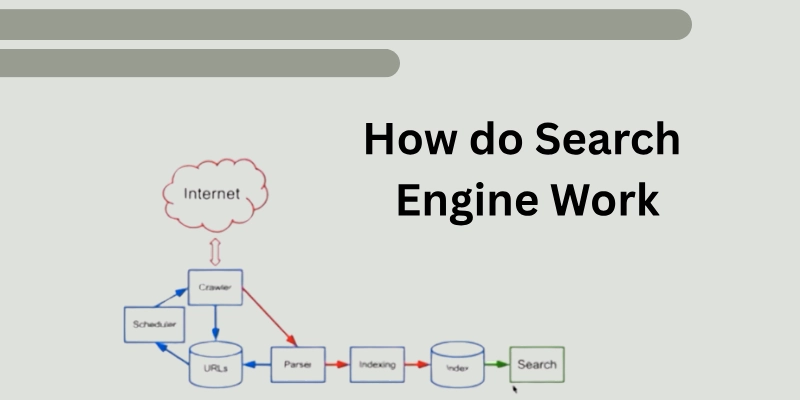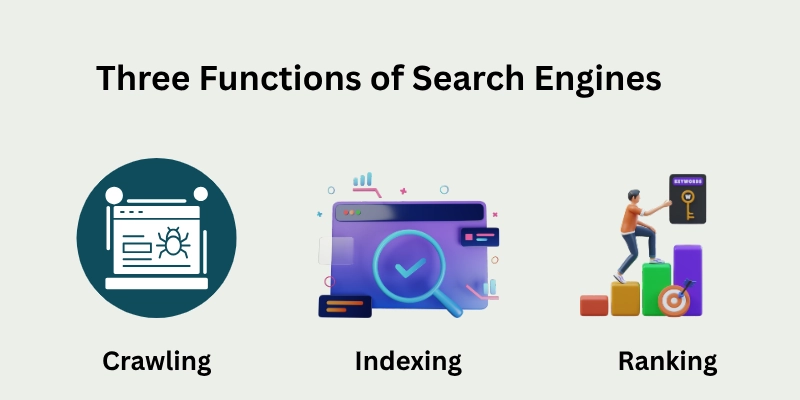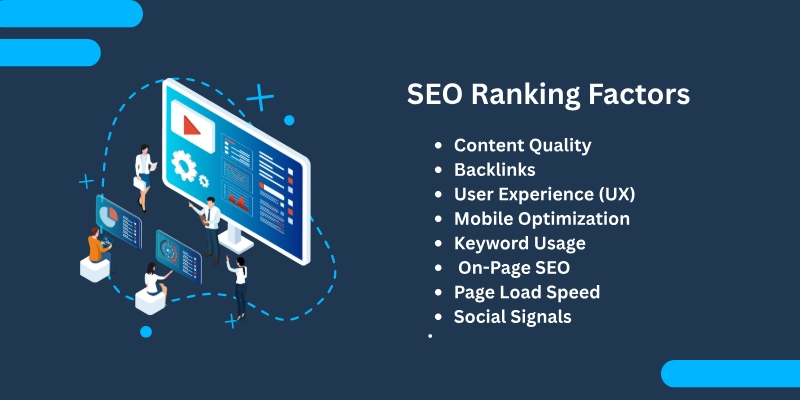How Do Google Search Engines Work? Comprehensive Guide
Published: 2 Jun 2025
In the modern digital world, understanding how search engines work is crucial for anyone looking to improve their website’s visibility and performance online. Search engines have become the gatekeepers of the internet, determining which content ranks highest on their results pages and, ultimately, how easily users can find your content. To navigate this ever-changing landscape, it’s important to comprehend the mechanics of search engines and what factors influence rankings.

In this article, we will explore in-depth how search engines work, the core processes involved, and strategies to optimize your content for better performance. Understanding the fundamentals of search engine functionality will help you enhance your website’s SEO and improve user experience.
The Role of Search Engines in the Digital Ecosystem
Search engines like Google, Bing, and Yahoo play a critical role in how we access and consume information on the web. They act as intermediaries between users and the vast amount of content available online. When a user types a query into a search bar, the search engine returns a list of relevant pages that are ranked according to various factors.
Search engines use complex algorithms to determine which web pages are most likely to provide users with the information they’re seeking. These algorithms take into account hundreds, if not thousands, of ranking signals to make this decision. By understanding these signals, webmasters can optimize their websites to improve their search engine rankings.

Three Core Functions of Search Engines
Three fundamental tasks search engines perform to help users find relevant information:
1. Crawling
Crawling refers to the process of discovering new and updated content on the internet. Search engines use automated bots (also known as crawlers or spiders) to scour websites and follow links to other pages. During the crawling process, the bots collect data about web pages, such as content, structure, and metadata.
The crawling process is essential because it allows search engines to index your website. Without being crawled, your site won’t be visible in search engine results.
2. Indexing
Once a search engine bot has crawled a webpage, it will analyze the page’s content and store it in a vast database known as the index. The index is essentially a catalog of all the content the search engine has discovered across the internet.
When a user searches, the search engine refers to this index to find the most relevant pages. A well-structured and optimized website is more likely to be correctly indexed, which in turn can improve its chances of ranking well in search results.
3. Ranking
Ranking is the final step in the process. After crawling and indexing, the search engine algorithm evaluates all of the indexed pages and determines the order in which they should appear on the search engine results pages (SERPs). The ranking process is where various factors, such as content relevance, page speed, backlinks, and user experience, come into play.
Websites that provide valuable, relevant, and high-quality content are more likely to rank higher. The ranking process ensures that users are presented with the most authoritative and pertinent content for their search queries.
Key Ranking Factors That Influence Search Engine Results
Several ranking factors influence how search engines determine the position of a webpage on their results pages. Some of these factors are within your control, while others are external. The key ranking factors include:

1. Content Quality
Search engines prioritize high-quality, informative content that answers the user’s query. Content that is well-written, comprehensive, and original is more likely to rank higher. Regularly updating content and ensuring that it’s relevant to current trends can also give your website an edge in search rankings.
2. Backlinks
Backlinks are an important off-page SEO factor that tells search engines that other websites trust and reference your content. The quality and quantity of backlinks can significantly impact your ranking. A website with a strong backlink profile is generally seen as more authoritative and trustworthy by search engines.
3. User Experience (UX)
User experience is a critical ranking factor. Search engines assess how easy it is for users to navigate your website, find what they’re looking for, and interact with your content. Factors such as page load speed, mobile responsiveness, and clear navigation are essential for providing a positive UX.
4. Mobile Optimization
With the majority of web traffic coming from mobile devices, search engines prioritize websites that are mobile-friendly. A responsive design that adapts to various screen sizes and provides an optimal viewing experience is crucial for ranking well in search results.
5. Keyword Usage
Keyword usage remains one of the most important ranking factors. Properly researching and strategically incorporating relevant keywords into your content, titles, and metadata helps search engines understand the context of your content. However, keyword stuffing can negatively affect your rankings, so it’s essential to use keywords naturally.
6. On-Page SEO
On-page SEO refers to optimizing elements on your website that help search engines understand the content and relevance of your pages. Key on-page SEO factors include optimizing title tags, header tags, meta descriptions, and image alt texts. Proper internal linking and clear URL structures also contribute to improved rankings.
7. Page Load Speed
The speed at which your website loads plays a significant role in both user experience and search engine rankings. Slow-loading pages tend to drive users away, leading to high bounce rates. Search engines prioritize fast-loading websites in their rankings to ensure a seamless user experience.
8. Social Signals
While social media presence is not a direct ranking factor, social signals (such as likes, shares, and comments) can indirectly affect rankings by driving traffic to your website and generating backlinks. High levels of engagement on social platforms can signal to search engines that your content is valuable and relevant.
How to Optimize Your Website for Search Engines
Now that we’ve covered how search engines work and the ranking factors involved, let’s look at how to optimize your website to improve its chances of ranking higher. Here are some key strategies to follow:
1. Focus on High-Quality Content
Create informative, valuable, and well-researched content that directly addresses the needs of your target audience. Use clear, concise language and avoid unnecessary jargon. Regularly update your content to keep it fresh and relevant.
2. Optimize for Mobile
Ensure your website is mobile-friendly by using a responsive design. Test your website on various devices to ensure it looks great and functions properly on both desktops and smartphones.
3. Improve Page Speed
Optimize your website’s load time by compressing images, minifying CSS and JavaScript files, and utilizing browser caching. A faster website will not only improve your rankings but also reduce bounce rates and increase conversions.
4. Build a Strong Backlink Profile
Earn high-quality backlinks from reputable websites within your industry. Focus on natural link-building strategies such as guest posting, content marketing, and outreach.
5. Use Keywords Strategically
Conduct thorough keyword research to identify the terms and phrases that your target audience is searching for. Incorporate these keywords naturally into your content, titles, headers, and meta descriptions.
6. Monitor Your Analytics
Use tools like Google Analytics and Google Search Console to track your website’s performance, monitor traffic, and identify areas for improvement. These tools provide valuable insights into how users interact with your site and what keywords are driving traffic.
Conclusion
Search engines are essential tools that help users find information online. In this guide on “How Do Search Engines Work,” we explored how understanding their core functions and ranking factors can improve your site’s visibility. By creating quality content, earning strong backlinks, enhancing user experience, and applying smart SEO techniques, you can boost your rankings. Keep up with algorithm updates and continuously refine your strategy to stay ahead in the digital world.
If you found this guide helpful or have any questions about SEO and how search engines work, don’t forget to leave a comment below. Your feedback helps us improve and share even more valuable insights!
FAQs
Here are some frequently asked questions to help you better understand how search engines work and how to improve your website’s SEO.
Search engines rank pages based on factors like keyword relevance, backlinks, page speed, mobile-friendliness, and user engagement. SEO practices help improve visibility in search results.
Indexing is when search engines crawl web pages and store their content in a database, making them available for relevant search queries.
Google uses your location to show more relevant, local results, such as nearby businesses or services. This improves the search experience based on where you are.
Google uses AI and machine learning to interpret the meaning behind search queries by analyzing context, past behavior, and content relevance.
Pages can rank higher due to strong backlinks, domain authority, and user engagement, even if the content quality is average.
Backlinks are links from other websites to your site. They act as votes of trust and authority, helping boost your site’s search engine ranking.
On-page SEO involves optimizing individual web pages with relevant keywords, meta tags, headers, and quality content to improve visibility in search engines.
Regular updates help keep your content fresh and relevant. Updating key pages every few months can boost rankings and user engagement.
A meta description is a summary of a page’s content shown in search results. While it doesn’t directly affect rankings, it can improve click-through rates.
SEO results typically take 3–6 months, depending on competition, site quality, and consistency of optimization efforts. Patience and ongoing work are key.

- Be Respectful
- Stay Relevant
- Stay Positive
- True Feedback
- Encourage Discussion
- Avoid Spamming
- No Fake News
- Don't Copy-Paste
- No Personal Attacks

- Be Respectful
- Stay Relevant
- Stay Positive
- True Feedback
- Encourage Discussion
- Avoid Spamming
- No Fake News
- Don't Copy-Paste
- No Personal Attacks





